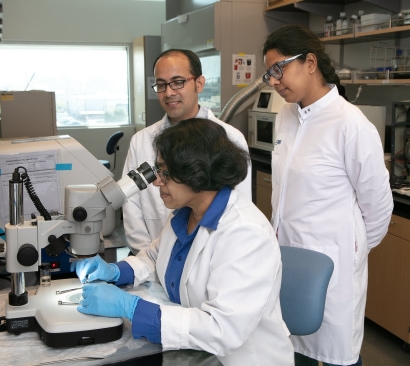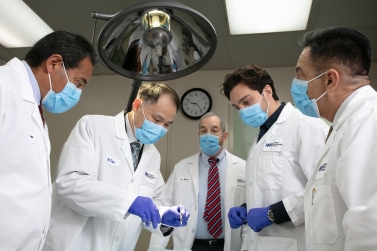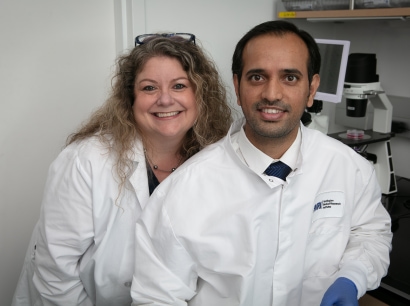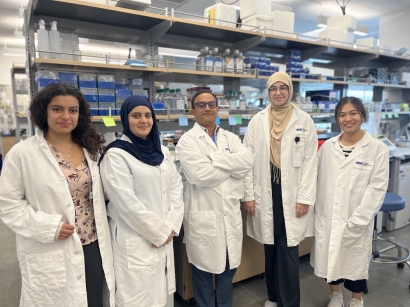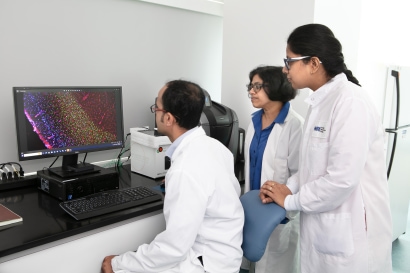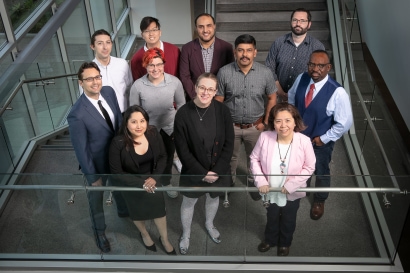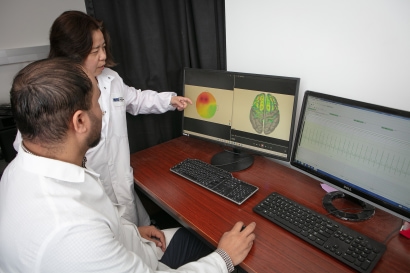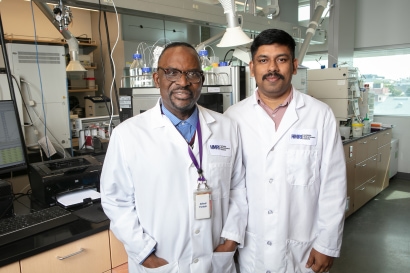HMRI Postdoctoral Fellowship
HMRI provides postdoctoral fellows with opportunities to conduct cutting-edge research alongside its distinguished faculty and leading experts in cardiology and neuroscience at its state-of-the-art research facility located in Pasadena, California, located in the foothills of the San Gabriel Mountains. As postdoctoral fellows explore the unknown and develop breakthroughs to improve human health, they deepen technical abilities in their chosen areas of expertise and benefit from mentorship, networking, and multidisciplinary collaborations. Scholars have a unique opportunity to engage with the thriving biotech ecosystems in Pasadena and across Southern California through collaborations with prominent institutions like Caltech and Keck School of Medicine of University of Southern California and local industry leaders and biotech startups.
Postdoctoral Fellowship Research Opportunities
Cardiovascular Research
Robert A. Kloner, MD, PhD
Chief Science Officer, Chair of Cardiovascular Research
Postdoctoral fellows mentored by Dr. Robert Kloner will investigate new mechanisms and models in heart failure and cardiogenic shock and generate novel approaches, including machine learning to reduce cell death during heart attack. New pharmacologic therapies that protect the mitochondria during ischemia/reperfusion are a recent focus of the laboratory. Additionally, the acute and chronic effects of electronic cigarette smoke and vaping on the cardiovascular system in normal young versus old hearts, and hearts with underlying heart disease, will be carefully examined. Furthermore, the effect of pure nicotine on the heart will be studied. Candidates with a background in vascular and myocardial biology are preferred. Experience in molecular and cell biology techniques, biochemistry, bioinformatics, and murine cardiac models are all considered strengths for this position.
Cardiovascular Signaling Laboratory
Nicole H. Purcell, PhD
Professor of Cardiovascular Research, Scientific Director of Education
Under the guidance of Dr. Nicole Purcell, postdoctoral fellows in the cardiovascular signaling laboratory will investigate the PHLPP family of Ser/Thr phosphatases in the heart and brain with age and injury. In addition, the project will define the epigenetic mechanisms required for phosphatase-mediated regulation of transcriptional changes that are important for cardiac homeostasis in young and aging mice. Using both in vitro and in vivo model systems, researchers will determine novel targets that regulate growth and metabolic signaling in the heart and brain with aging and nicotine use. The ideal candidate will have a strong background in molecular and cellular biology with expertise in primary cell culture, cardiac mouse models, biochemistry, bioinformatics, and myocardial and cerebrovascular biology.
Neuro- Cardio- Immunology Laboratory
Abdala Elkhal, PhD
Assistant Professor, Immunology
In the Neuro- Cardio- Immunology laboratory, postdoctoral fellows will work under the direction of immunologist Dr. Abdala Elkhal to research changes in the immune system causing disease, including autoimmune diseases, allergies, immunodeficiencies, and cancer. The program investigates alterations that target the adaptive and/or innate immune system and aims to re-establish an adequate/balanced immune response using novel therapies such as nicotinamide adenine dinucleotide (NAD+). The immune system is vital to understanding the connection between the heart and brain and is increasingly recognized as a critical aspect of neurodegeneration and cardiovascular diseases. Researchers will use a combination of disease models, genetics, cell biology, immunology, biochemistry, and imaging techniques to achieve research goals. Candidates should have expertise in immunology techniques such as ELISA, flow cytometry, real-time PCR, immunohistochemistry, and cell culture.
Angiogenesis and Brain Development Laboratory
Anju Vasudevan, PhD
Professor, Chair and Scientific Director, Basic and Translational Neurosciences
Postdoctoral fellows in the Angiogenesis and Brain Development laboratory, led by Dr. Anju Vasudevan, will investigate novel mechanisms underlying cell-autonomous programs that regulate endothelial and neuronal cell development in the forebrain to uncover new causes for the origin of neuropsychiatric diseases like schizophrenia, autism, epilepsy, and depression. The research will tap into the potential of CNS angiogenesis as a therapeutic source for recovery of neurological function in many diverse scenarios. The ideal candidate will have a relevant background either in neuroscience, developmental biology, or cell biology with experience in endothelial cell culture, transgenic mouse models, or stem cell biology.
Clinical Brain Aging Study
Robert A. Kloner, MD, PhD
Chief Science Officer, Chair of Cardiovascular Research
HMRI began research on neurodegeneration over twenty years ago. Today, the formalized Brain Aging Study is led by Dr. Robert A. Kloner. Under his leadership, postdoctoral fellows will investigate new mechanisms and markers for early stages of neurodegeneration and Alzheimer’s disease. Successful candidates will have an interest in Alzheimer’s disease and related dementias, as well as a strong background in at least one of: tissue and molecular science; neuroscience; cognitive and functional assessment; population and data science; and closely related fields.
Cognition and Brain Integration Laboratory
Xianghong Arakaki, MD, PhD
Associate Professor, Neurosciences Research
Under the guidance of Dr. Xianghong Arakaki, a postdoctoral fellow in the Cognition and Brain Integration Laboratory (CBIL) will investigate the brain and heart waves during resting or cognitive challenges in neurological conditions, including presymptomatic Alzheimer's disease. The project will link cognitive challenge processing (time-frequency and functional connectivity analysis) to the risk of dementia, and we are both developing and evaluating non-invasive biomarkers to help identify those with AD pathologies. The ideal candidate will have a strong background in cognitive neuroscience, psychology, engineering, or a related discipline, with extensive experience in data analysis, computational neuroscience, and/or signal processing, and be proficient in Matlab/Python.
Biomarker and Neuro-Disease Mechanism Laboratory
Alfred Fonteh, PhD
Research Professor, Neurosciences Research
Postdoctoral fellows in the Biomarker and Neuro-disease Mechanism Laboratory, directed by Dr. Alfred Fonteh, will use modern analytical methods to discover novel biomarkers and investigate biochemical pathways altered in Alzheimer’s Disease and Chronic pain syndromes. The research will use multi-omics platforms to identify metabolites and enzymes responsible for disease-modifying mechanisms such as inflammation, energy and mitochondrial dysfunction, and oxidative stress. The ideal candidate will have a passion for discovery and a relevant background in neuroscience, analytical biochemistry, mass spectrometry, and managing big data sets.
Eligibility
To be eligible for the HMRI Postdoctoral Fellowship, applicants must have completed a PhD, MD, or MD, PhD program and may have no more than five years of research training or experience since obtaining a doctoral-level degree.
Application Process
Candidates must select and apply for one of the postdoctoral research opportunities based on research interests, expertise, and career trajectory. Application materials should include a cover letter with a brief summary of career goals and objectives, a CV, copies of published abstracts or papers, and three letters of recommendation. Submissions are accepted and reviewed on a rolling basis and continue until the positions are filled.
Application Is Now Open
HMRI EEO Policy
HMRI provides equal employment opportunities to all employees and applicants for employment and prohibits discrimination and harassment of any type without regard to race, color, religion, age, sex, national origin, disability status, genetics, protected veteran status, or any other characteristic protected by federal, state or local laws. This policy applies to all terms and conditions of employment, including recruiting, hiring, placement, promotion, termination, layoff, recall, transfer, leaves of absence, compensation, and training.

